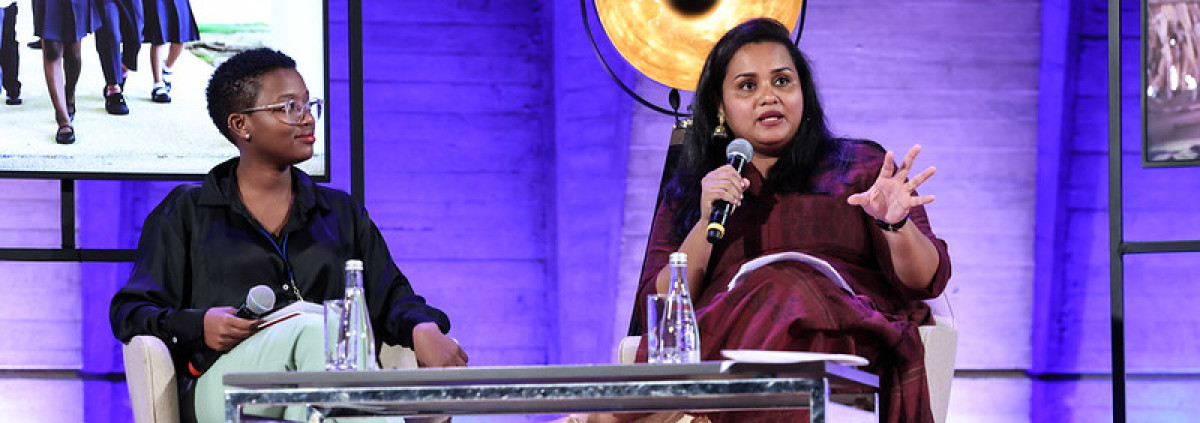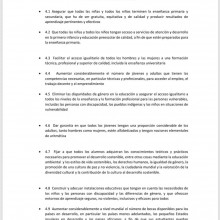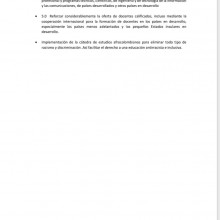Youth Declaration consultation process
Welcome to the discussion on the Youth Declaration consultation process. The discussion ensures engagement and is open to all. To get involved in the discussion, sign up, create your log in and share your thoughts below ⬇
Explanation about the process
Transforming education can only be achieved if we, young people, are included in the processes of implementing policy and systematic changes to education stakeholders and governments. This is why youth must be engaged in critical events that will shape education’s future, such as the Transforming Education Summit (TES) (September 2022).
Developed by the Office of the Secretary-General's Envoy on Youth together with the Summit Secretariat hosted by UNESCO and a number of partners, the Youth Declaration has:
- gathered young people’s collective views on what transforming education should look like
- outlined young people’s collective recommendations to decision and policymakers, including governments, civil society, international organizations, the United Nations, and others on transforming education
- highlighted young people’s collective commitments and actions towards transforming education
Watch a video on the process
The Youth Declaration was presented, on 16 September 2022, to the Secretary-General as young people’s inputs to the Chair's Summary of the Transforming Education Summit.
Young people all over the world were encouraged to shape and influence this crucial document. With the support of the European Commission, a global campaign was launched, asking youth how they would transform education. Young people's innovative ideas were shared widely and can also be found here.
Watch the introduction to the Youth Declaration by Jayathma Wickramanayake, United Nations Secretary-General's Envoy on Youth and SDG4Youth members Doris Mwikali and Sofia Bermudez at the Pre-Summit 28-30 June at UNESCO HQ Paris
Process
The Declaration heard from youth around the world with different backgrounds and contexts. To this end, several public consultations took place between June and September 2022. In addition, the Youth Declaration took into account outcomes of past consultations and various calls to action and other resources that have been developed in relation to the Transforming Education Summit. An independent consultant was responsible for bringing all these resources together and ensuring that young people in all their diversity and worldwide were engaged in a meaningful, diverse, and effective manner throughout this process.
Desk review of key resources and consultations
The Youth Declaration was informed by the following key consultations:
- World Largest Lesson’s Transforming Education Survey (Transforming Education Survey | The World's Largest Lesson - globalgoals.org)
- UNESCO’s “Three questions to Transform Education” Survey - the survey can be found on the Futures of Education website in English | French | Spanish
- UNICEF U-Report poll calling on all young people to share their views on Transforming Education: Messenger https://bit.ly/TEducationFB | WhatsApp https://bit.ly/TEducationWA | Viber https://bit.ly/TEducationVR
Other key resources include:
- Solidarity Circle Event - International Day of Education 2022
- ECOSOC Youth Forum SDG4 Breakout Session 2022
- SDG4Youth Proposal for Transforming Education
- Unlock the Future Proposal for the Transforming Education Summit
- World Higher Education Conference, Barcelona
- APREMC II Ministerial Conference, Bangkok
- Asia-Pacific Regional Youth Call to Action ahead of the APFSD 2022
Youth Declaration Consultations
During the Pre-Summit, a Youth Consultation was held on June 29th 2022. The following takeaways can be highlighted:
- To ensure youth can keep track of the commitments made by governments to transform education, an accountability mechanism must be established. This is critical to create structural changes and ensure countries put education on the agenda.
- Young people not only need to be heard by stakeholders and governments, but if we really want to achieve SDG4 and transform education, they also need to be included in the process and play an active role.
- Any proposal, action, or change we want for education in any field demands more financing. Countries must commit to transforming education not only by words but by concrete actions and funding. Otherwise, we will never be able to create structural changes and ensure access to quality education for everyone.
A second consultation was held online in July and a third in August.
Make your voice heard right here!
If you haven’t done so yet, it is never too late to share your thoughts:
Sign in & post your comments below.



Pls see attached the 4 Priorities